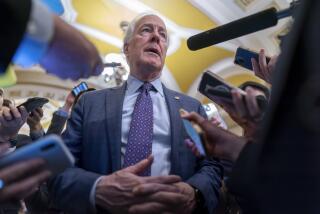U.S. Senate race in Pennsylvania set; pro-Palestinian congresswoman fends off primary challenge

Democratic Sen. Bob Casey and Republican challenger David McCormick will face off in Pennsylvania’s high-stakes U.S. Senate contest this fall, as Tuesday’s primary election put them on track for a race that is expected to cost hundreds of millions of dollars and help decide control of the chamber next year.
Casey and McCormick won their uncontested party primary contests and now enter what is likely to be a grueling, expensive and hard-fought campaign that culminates with the Nov. 5 general election.
Also Tuesday, Pittsburgh-area Rep. Summer Lee fended off a Democratic primary challenge over her opposition to Israel’s war in the Gaza Strip, in what was seen as a key electoral test for progressive Democrats in Congress who’ve been criticized for their pro-Palestinian position.
Casey, seeking his fourth term, is perhaps Pennsylvania’s best-known politician and a stalwart of the state’s Democratic Party. He is the son of a two-term governor and is the state’s longest-serving Democrat in the Senate.
McCormick is a two-time Senate challenger, a former hedge fund CEO and a Pennsylvania native who spent $14 million of his own money to lose narrowly to celebrity heart surgeon Dr. Mehmet Oz in 2022’s seven-way GOP primary. Oz then lost to Democrat John Fetterman in a pivotal Senate contest.
This time around, McCormick has consolidated the party around his candidacy and is backed by a super PAC that has reported raising more than $20 million, much of it from securities-trading billionaires.
McCormick’s candidacy is shaping up as the strongest challenge to Casey in his three reelection bids. On Tuesday night he hammered his message that Casey is a do-nothing senator.
“We’re now turning to the general election, and here’s the truth: Pennsylvania deserves better than Bob Casey. You deserve better,” McCormick told a gathering in Pittsburgh. “Bob Casey’s defining achievement in his political life, 30 years in political office, has been to be the son of Bob Casey Sr. That is what defines his political career.”
Casey, in Washington on Tuesday to cast votes in favor of $95 billion in military aid to Ukraine, Israel and Taiwan, said on social media that “there are 196 days until the general election, and we’re going to win.” Meanwhile, the state Democratic Party unveiled a digital ad slamming McCormick as a “millionaire hedge fund executive who is lying to Pennsylvanians.”
Casey and McCormick will share a ticket with candidates for president in a state that is critical to whether Democrats can maintain control of the White House and the Senate.
President Biden and former President Trump won their party nominations in the state easily after all major rivals dropped out. Both men made campaign trips to swing-state Pennsylvania in recent days, and voters can expect to see plenty of them, their TV ads and their surrogates campaigning over the next six months in a state that swung from Trump in 2016 to Biden in 2020.
Of note could be the number of “uncommitted” write-in votes cast in the Democratic primary to protest Biden’s handling of the Israel-Hamas war.
In the Senate contest, Democrats have attacked McCormick’s opposition to abortion rights; his frequent trips to Connecticut’s ritzy “Gold Coast,” where he keeps a family home; and the focus on investing in China during his dozen years as an executive at the hedge fund Bridgewater Associates, including as chief executive.
Casey has been a key player for Democrats trying to reframe the election-year narrative about the economy by attacking “greedflation” — a term for corporations that jack up prices and rip off shoppers to maximize profits. Recent indications that the economy avoided a recession amid the Biden administration’s efforts to manage inflation have yet to translate into voter enthusiasm for the president’s reelection.
McCormick, meanwhile, has accused Casey of rubber-stamping Biden’s immigration, economic, energy and national security policies and made a bid for Jewish voters by traveling to the Israel-Gaza border and arguing that the president hasn’t backed Israel strongly enough in its war against Hamas.
Casey is one of Biden’s strongest allies in Congress. McCormick and Trump have endorsed each other but are an awkward duo atop the GOP’s ticket after Trump savaged McCormick in 2022’s primary in a successful bid to lift Oz to his win.
Democrats hold a Senate majority by a one-vote margin and face a difficult 2024 Senate map that requires them to defend incumbents in the red states of Montana and Ohio and fight for open seats with new candidates in Michigan and West Virginia.
A Casey loss could guarantee Republican control of the Senate.
Elsewhere on the ballot Tuesday, Pennsylvanians decided nominees for an open attorney general’s office and two other statewide offices — treasurer and auditor general — plus all 17 of the state’s U.S. House seats and 228 of the state’s 253 legislative seats.
For attorney general, Republicans nominated Dave Sunday, York County’s district attorney, in a two-way race, while Democrats nominated former state Auditor General Eugene DePasquale of Pittsburgh in a five-candidate primary field.
Democrats also nominated Erin McClelland, a two-time congressional candidate in suburban Pittsburgh who has helped run various human services organizations, to challenge Republican state Treasurer Stacy Garrity, and state Rep. Malcolm Kenyatta of Philadelphia to challenge Republican state Auditor General Tim DeFoor. McClelland prevailed despite being heavily outspent by her party-endorsed rival.
For Congress, 44 candidates were on ballots, including all 17 incumbents. All three incumbents facing primary challengers — Republican Rep. Brian Fitzpatrick in suburban Philadelphia and Democratic Reps. Dwight Evans in Philadelphia and Lee in her Pittsburgh-based district — won their races.
Lee’s primary against challenger Bhavini Patel shaped up as an early indicator of whether Israel’s war with Gaza poses political threats to House progressives who have criticized how it has been handled.
Republicans nominated state Rep. Ryan Mackenzie in a three-way race to challenge Democratic Rep. Susan Wild, whose Allentown-based district is politically divided, while Democrats nominated former TV news personality Janelle Stelson from among six candidates to challenge Republican Rep. Scott Perry of southern Pennsylvania.
Perry has become a national figure for heading up the ultra-right House Freedom Caucus during a speakership battle and his efforts to help Trump stay in power despite losing the 2020 presidential election.
Levy writes for the Associated Press.
More to Read
Get the L.A. Times Politics newsletter
Deeply reported insights into legislation, politics and policy from Sacramento, Washington and beyond. In your inbox three times per week.
You may occasionally receive promotional content from the Los Angeles Times.






